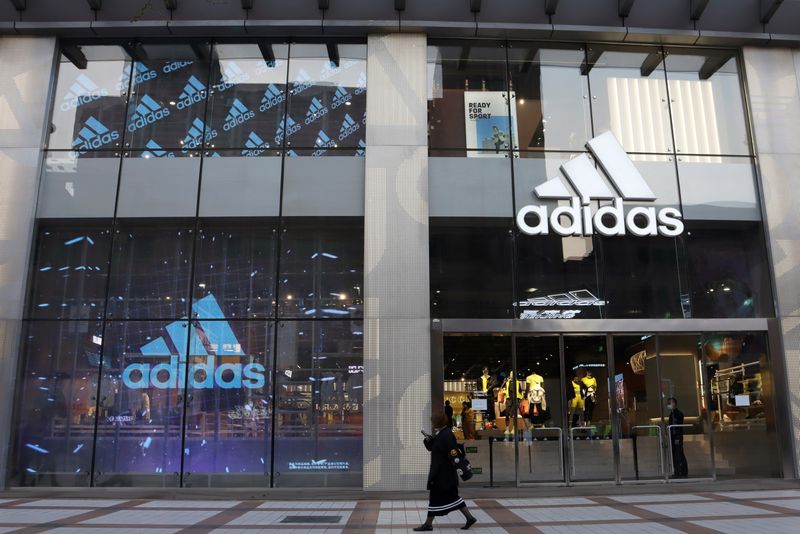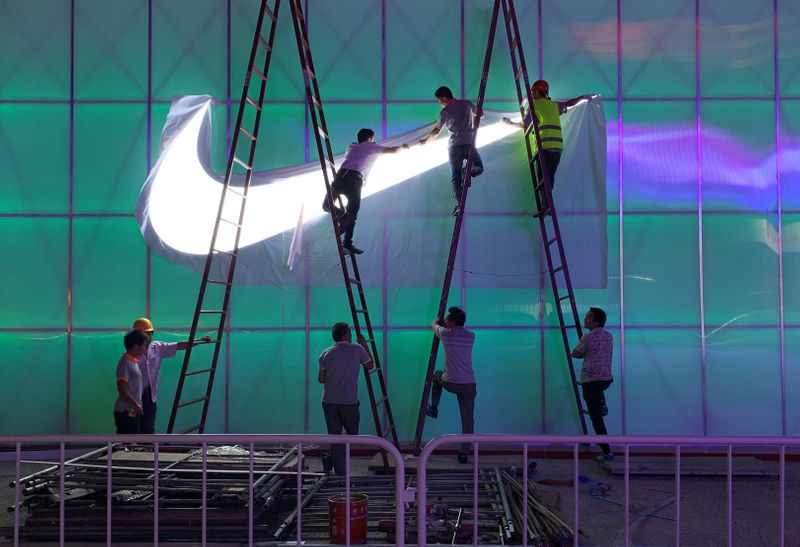BEIJING (Reuters) - Nike (NYSE:NKE) and Adidas (OTC:ADDYY) came under fire on Chinese social media on Thursday after Beijing's propaganda offensive against Swedish fashion brand H&M sparked by the company's expression of concern about labour conditions in Xinjiang.
The sportswear companies were the latest to be caught up in a backlash prompted by a government call to stop foreign brands from tainting China's name as internet users found statements they had made in the past on Xinjiang.
Chinese state media had singled out H&M on Wednesday over a statement that was reported last year in which the Swedish retailer said it was deeply concerned by reports of accusations of forced labour in Xinjiang, and that it did not source products from the Chinese region.
It was unclear why the H&M statement was back in the public eye but diplomatic tensions between China and the West have been rising.
Earlier this week, China denied allegations of human rights abuses by its officials in the western region of Xinjiang after the European Union, United States, Britain and Canada imposed sanctions on the officials.
Beijing hit back with retaliatory sanctions on European lawmakers, scholars and institutions.
Some internet users said they would stop buying Nike and will support local brands such as Li Ning and Anta, while others told Adidas to leave China.
Shares of Anta Sports Products Ltd and Li Ning Co surged, while shares in Adidas, Inditex (MC:ITX) and H&M fell when European markets opened on Thursday.
State tabloid Global Times said Spain's Inditex, owner of Zara, had "quietly removed" a statement on Xinjiang from its English and Spanish-language websites.
Inditex did not respond to a Reuters request for comment.
BOYCOTT
Internet users also targeted the Better Cotton Initiative (BCI), a group that promotes sustainable cotton production which said in October it was suspending its approval of cotton sourced from Xinjiang for the 2020-2021 season, citing human rights concerns.
BCI members include Nike, Adidas, H&M and Japan's Fast Retailing.
"If you boycott Xinjiang cotton, we'll boycott you. Either Adidas quits BCI, or get out of China," one internet user wrote.
Nike, Adidas and the BCI did not respond to requests for comment.
H&M said on Wednesday it respected Chinese consumers and that it was committed to long-term investment and development in China.
But by Thursday morning, H&M did not exist on some Chinese store locator maps. Searches for H&M stores on Baidu (NASDAQ:BIDU) Maps yielded no results. The retailer's official store on Alibaba (NYSE:BABA)'s Tmall, an e-commerce platform, was inaccessible.
At a daily media briefing at China's foreign ministry, spokeswoman Hua Chunying, when asked about H&M, held up a photograph of Black Americans picking cotton.
"This was in the U.S. when Black slaves were forced to pick cotton in the fields," she said.
Hua then held up a second photograph of cotton fields in Xinjiang.
"More than 40% of the cotton in Xinjiang is harvested by machinery, so the alleged forced labour is non-existent."
People's Daily, the main newspaper of the Communist Party, rolled out a social media campaign in support of cotton sourced from Xinjiang.
The graphic "I support Xinjiang cotton" posted by the newspaper on the Twitter-like microblog Weibo (NASDAQ:WB) has since attracted about 2.2 million likes.
Japanese retailer Muji, owned by Ryohin Keikaku Co, told the Global Times that it uses Xinjiang cotton, winning praise from Chinese internet users, who lauded the firm's "survival instincts".

Ryohin Keikaku recently conducted due diligence for Xinjiang factories, with which it has an indirect relationship via its supply chain, and also commissioned an independent audit group to make onsite audits, but found no significant issues, the company told Reuters on Thursday.
